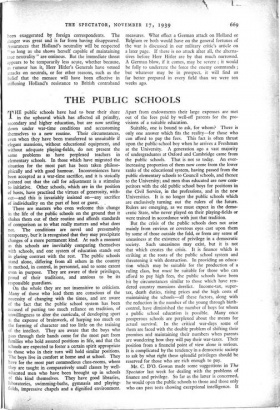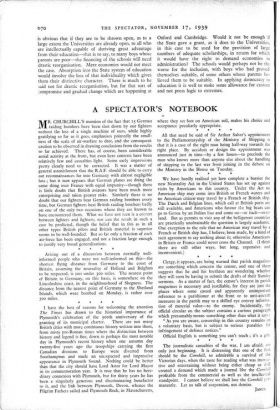THE PUBLIC SCHOOLS
THE public schools have had to bear their share in the upheaval which has affected all primiry, secondary and higher education, but are now settling down under war-time conditions and accustoming themselves to a new routine. Their circumstances, even when they have been transferred to unsuitable if elegant mansions, without educational equipment, and without adequate playing-fields, do not present the same problems as have perplexed teachers in elementary schools. In those which have migrated the situation for the most part has been taken philoso- phically and with good humour. Inconveniences have been accepted as a war-time sacrifice, and it is stoically pointed out that the call for adjustment is a stimulus to initiative. Other schools, which are in the position of hosts, have practised the virtues of generosity, with- out—and this is invariably insisted on—any sacrifice of individuality on the part of host or guest.
There are masters who even welcome this change in the life of the public schools on the ground that it shakes them out of their routine and affords standards of comparison as to what really matters and what does not. The conditions are novel and presumably temporary, butlt is recognised that they may precipitate changes of a more permanent kind. At such a moment as this schools are inevitably comparing themselves with schools, and one system of education stands out in glaring contrast with the rest. The public schools stand alone, differing from all others in the country in method, in control, in personnel, and to some extent even in purpose. They are aware of their privileges, proud of their traditions, and anxious to be its responsible guardians.
On the whole they are not insensitive to criticism. Many of those who lead them are conscious of the necessity of changing with the times, and are aware of the fact that the public school system has been accused of putting too much reliance on tradition, of unwillingness to alter the curricula, of developing sport a, the expense of brainwork, of harping too much on the forming of character and too little on the training of the intellect. They are aware that the boys who pass through their hands come for the most part from families who hold assured positions in life, and that the schools are expected to foster a certain spirit appropriate to those who in their turn will hold similar positions. The boys live in comfort at home and at school. They have for the most part commodious class-rooms, where they are taught in comparatively small classes by well- educated men who have been brought up in schools of this kind themselves. They have good libraries, laboratories, swimming-baths, gymnasia and playing- fields, impressive chapels and a dignified environment. Apart from endowments their large expenses are met out of the fees paid by well-off parents for the pro- visions of a suitable education.
Suitable, one is bound to ask, for whom? There is only one answer which fits the reality—for those who can afford to pay the fees. This fact is often thrust upon the public-school boy when he arrives a Freshman at the University. A generation ago a vast majority of undergraduates at Oxford and Cambridge came from the public schools. That is not so today. An ever- increasing proportion of them now come from the lower ranks of the educational system, having passed from the public elementary schools to Council schools, and thence to the University; and men thus educated are now com- petitors with the old public school boys for positions in the Civil Service, in the professions, and in the new Universities. It is no longer the public schools which are exclusively turning out the rulers of the future. Rulers are emerging, as we must expect in the demo- cratic State, who never played on their playing-fields or were trained in accordance with just that tradition.
But the crisis of the public schools does not arise mainly from envious or covetous eyes cast upon them by some of those outside the fold, or from any sense of uneasiness at the existence of privilege in a democratic society. Such uneasiness may exist, but it is not that which creates the crisis. It is finance which is striking at the roots of the public school system and threatening it with destruction. In providing an educa- tion which may be suitable for the production of a ruling class, but must be suitable for those who can afford to pay high fees, the public schools have been hit by circumstances similar to those which have ren- dered country mansions derelict. Income-tax, super- tax, death duties, rising prices and the high costs of maintaining the schools—all these factors, along with the reduction in the number of the young through birth- control, have diminished the number of boys for whom a public school education is possible. Many once prosperous schools are perplexed about the means for actual survival. In the critical war-days some of them are faced with the double problem of shifting their premises and maintaining their numbers when parents are wondering how they will pay their war-taxes. Their position from a financial point of view alone is serious. It is complicated by the tendency in a democratic society to ask by what right these splendid privileges should be reserved for those who are rich enough to pay.
Mr. C. D'O. Gowan made some suggestions in The Spectator last week for dealing with the problems of finance and privilege. So far as the latter is concerned, he would open the public schools to those and those only who can pass tests showing exceptional intelligence. It is obvious that if they are to be thrown open, as to a large extent the Universities are already open, to all who are intellectually capable of deriving great advantage from their education—that is to say, to many boys whose parents are poor—the financing of the schools will need drastic reorganisation. Mere economies would not meet the case. Absorption into the State system of education would involve the loss of that individuality which gives them their distinctive character. There is much to be said not for drastic reorganisation, but for that sort of :ompromise and gradual change which are happening at
Oxford and Cambridge. Would it not be enough if the State gave a grant, as it does to the Universities, in this case to be used for the provision of large numbers of adequate scholarships, in return for which it would have the right to demand economies in administration? The schools would perhaps not be the worse for the inclusion, with boys who had proved themselves suitable, of some others whose parents be- lieved them to be suitable. In applying democracy to education it is well to make some allowance for custom and not press logic to extremes.





































































 Previous page
Previous page